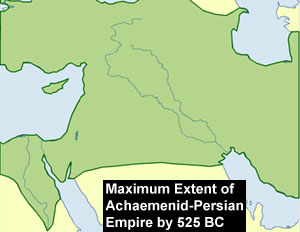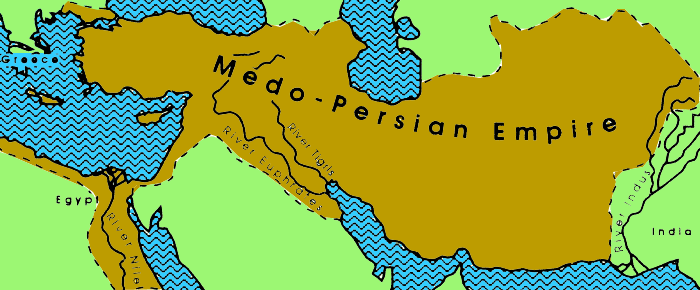|
|
|
|
 CHAPTER 2
CHAPTER 2
 Artaxerxes sends Nehemiah to Jerusalem—Sanballat and other oppose Nehemiah in rebuilding walls and gates of Jerusalem. |
The complexity of the timeline of the Persian Empire is complicated by the fact that there was a system of various Emporers and/or Regional Kings, some ruling and reigning concurrently and in conjuction one with the other. Some attempt to stack these end to end without considering the concurrancy of the regional reigns. | The Jewish priest Ezra, by means of a letter of decree by Cyrus was to take charge of the ecclesiastical and civil affairs of the Jewish nation. He left Babylon in the first month of the seventh year of Artaxerxes' reign. In the 20th year of Artaxerxes was Nehemiah the king's cup bearer. |
|
1 And it came to pass in the month Nisan, in the twentieth
year of Artaxerxes the king, that wine was before him: and I took up the wine, and gave it unto the king. Now I had not been beforetime sad in his presence.
2 Wherefore the king said unto me, Why is thy countenance sad, seeing thou art not sick?a this is nothing else but sorrow of heart. Then I was very sore afraid, 3 And said unto the king, Let the king live for ever: why should not my countenance be asad, when the city, the place of my fathers' sepulchres, lieth waste, and the gates thereof are consumed with fire? |
2a Why is thy countenance sad, seeing thou art not sick? Often the relationship between the master and the 'slave'-servant is painted without any human or humane feeling, but always in a dark and mean cast of characters of the 'lord' who is constantly beating the over burdened slave labourer. Yes, that type of relationship has and does exist, but more often is there the sort of human relationships between enslaved and master which too often goes untold to the total discredit of the master. In the case of the 'hebrew' slave-servant, they were more often the obedient servant who would gain favor in their master's eyes and even begin to gain the master's feelings of interest for and in their welfare. Here it is obvious that such a human and humane relationship did exist as Artaxerxes the king has taken a genuine interest his his hebrew servant and seemingly considered to some degree friend as well. |
3a
Ps. 137:4
|
|
4 Then the king said unto me, For what dost thou make request? So I prayed to the God of heaven.
5 And I said unto the king, If it please the king, and if thy servant have found favour in thy sight, that thou wouldest send me unto Judah, unto the city of my fathers' sepulchres, that I may build it. 6 And the king said unto me, (the queen also sitting by him,) For how long shall thy journey be? and when wilt thou return? So it pleased the king to send me; and I set him a time. |
||


In Artaxerxes' 20th year (445 BC), Nehemiah, the king's cupbearer, apparently was also a friend of the king as in that year Artaxerxes inquired after Nehemiah's sadness. Nehemiah related to him the plight of the Jewish people and that the city of Jerusalem was undefended. The king sent Nehemiah to Jerusalem with letters of safe passage to the governors in Trans-Euphrates, and to Asaph, keeper of the royal forests, to make beams for the citadel by the Temple and to rebuild the city walls. |
||
|
7 Moreover I said unto the king, If it please the
king, let letters be given me to the governors abeyond the
river, that they may convey me over till I come into Judah;
8 And a letter unto Asaph the keeper of the king's forest, that he may give me timber to make beams for the gates of the palace which appertained to the house, and for the wall of the city, and for the house that I shall enter into. And the king granted me, according to the good hand of my God upon mea.
|
8a the king granted me, according to the good hand of my God upon me What 'slave-servant' would be so bold? Both the king, a friendly to Nehemiah as he may have been, and Nehemiah both would have been impressed upon by the presence of the spirit of God upon them. Certainly even a friendship has reasonable limits, but for this king to go to the extra lengths, not so much as demanded, but by the directing presence of God upon the king to grant his serant's extreme desires of the king. It must have been quite the experience for the both of them to have undergone what the hand of the Lord certainly caused to happen upon them. |
7a IE on the west side of the Euphrates River
|
 | ||
|
9 ¶ Then I came to the governors beyond the river, and gave them the king's letters. Now the king had sent captains of the army and horsemen with me.
10 When aSanballat the Horonite, and bTobiah the servant, the Ammonite, heard of it, it grieved them exceedingly that there was come a man to seek the welfare of the children of Israel. 11 So I came to Jerusalem, and was there three days. |
10a
Neh. 4:1(1-8);
Neh. 6:1(1-14) b Neh. 6:16
|
|
|
12 ¶ And I arose in the night, I and some few men with me; neither told I any man what my God had put in my heart to do at Jerusalem: neither was there any beast with me, save the beast that I rode upon.
13 And I went out by night by the agate of the bvalley, even before the cdragon well, and to the ddung port, and viewed the walls of Jerusalem, which were broken down, and the gates thereof were consumed with fire. |
13a
IE the name of a gate in the wall of Jerusalem, approx. modern Jaffa gate b Neh. 3:13 c OR fountain of the jackals—a well located near Jerusalem. d IE another gate in the wall of Jerusalem at approx. junction of Hinnom and Tyropoeon valleys; Neh. 3:13; Neh. 12:31
|
|
|
14 Then I went on to the agate of
the fountain, and to the king's pool: but there was no place for the
beast that was under me to pass.
15 Then went I up in the night by the brook, and viewed the wall, and turned back, and entered by the gate of the valley, and so returned. 16 And the rulers knew not whither I went, or what I did; neither had I as yet told it to the Jews, nor to the priests, nor to the nobles, nor to the rulers, nor to the rest that did the work. |
14a
Perhaps a gate near En-rogel. The king's pool could be Siloam; Neh. 3:15; Neh. 12:37
|
|
|
17 ¶ Then said I unto them, Ye see the distress
that we are in, how Jerusalem lieth awaste,
and the gates thereof are burned with fire: come, and let us build up the
wall of Jerusalem, that we be no more a reproach.
18 Then I told them of the hand of my God which was good upon me; as also the king's words that he had spoken unto me. And they said, Let us rise up and build. So they strengthened their hands for this good work. |
17a
Ezek. 5:14
|
|
|
19 But when Sanballat the Horonite, and Tobiah the
servant, the Ammonite, and Geshem the Arabian, heard it, they
alaughed us to bscorn, and despised us,
and said, What is this thing that ye do? will ye rebel against the
king?
20 Then answered I them, and said unto them, The God of heaven, he will prosper us; therefore we his servants will arise and build: but ye have no portion, nor right, nor memorial, in Jerusalem. |
19a
TG
Laughter b Ps. 123:4; 1 Ne. 8:33; Alma 26:23
|
|